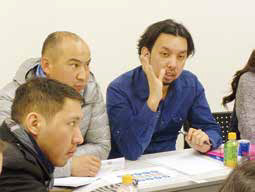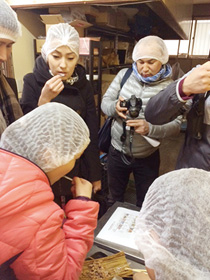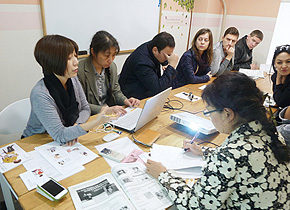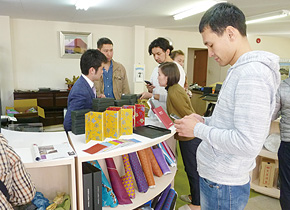Information of 4 Japanese companies
Over 200 companies and organizations are visited each year through PREX seminars.
Participants from developing countries get a sense of admiration, are impressed by the thoughts of managers, and can acquire many revelations and lots of learning by facts that are sensed as regular and normal things in Japan. The PREX staff are also made aware of the wonder of Japanese companies and their managers, through the views of seminar participants. We introduce four companies from the ones visited by young Kyrgyz company managers who participated in the Kyrgyz Business Course Seminar implemented last year and this year.
Stationery retailing and Internet sales Waki Stationery (Waki Stationery, Limited Company)
 |
Fukushima Ward, Osaka City, Osaka Prefecture |
Waki Stationery is a well established business founded in 1926 in the center of a shopping arcade in Fukushima Ward, Osaka City. Company President Kishii inherited the business in his 20s. He launched sales over the Internet at an early stage, in 2003. A growing number of companies sell similar kinds of stationery goods over the Internet. Even so, his business is transmitting the message about the charm of “Osaka, a manufacturing town,” and the wonder of Japanese products as a new mission, being prompted by the rediscovery of the high quality of Japanese stationery and the acclaim it receives from around the world. Seminar participants have done field trips there, learning about its business and experiences to date, along with its distribution center’s shipping operations. Like the participants, President Kishii is young, and he helps them with a friendly attitude and has lively opinion exchanges with them.
Stationery used to be manufactured based on uniform standards in Central Asia during the Soviet Era. Now, a time when people’s lifestyles and needs are becoming more diverse, responding to these changes has turned into a business opportunity. The efforts by Waki Stationery have been offering a new perspective for the seminar participants.

Over 50 straight years of natto Manufacturing, processing and brand creation Koganeyasyokuhin Co. Ltd.
 |
Daito City, Osaka Prefecture |
Koganeyasyokuhin, located in Daito City, is continuing on with its founder’s ideas, and for over half a century continues to make natto, which is rare in Osaka.
Second-generation President Yoshida, along with his employees — as “Team Koganeya” — have come out with new brands, including “Naniwara Natto” and “The Ippin Natto.”
The story leading up to the release of Naniwara Natto, referred to as “The Koganeya Story,” has been told to many people, together with the products, and generated a large number of fans. The company has also become widely known through its efforts to develop containers with elegant designs and its direct sales over the Internet. The seminar participants visited the company in March. And in the preceding February, “Natto Bar Kogane-an,” said to be Osaka’s first shop to specialize in natto, opened its doors, providing a place where even more people can experience natto. The seminar had a field trip to natto production sites, along with a lecture by President Yoshida.
The seminar participants learned about a variety of things, including the importance of carrying on with the ideas of company founders, as a manager, the possibility of being able to create a market for new items, even for traditional food products, and the specific measures involved.

A strategy of “women’s social progress Mo-House
 |
Tsukuba City, Ibaraki Prefecture |
Mo-House designs, manufactures and sells clothes for infant nursing. Company President Mitsuhata launched the company after experiencing the breast-feeding period herself. Along with holding various events and shows related to breastfeeding and sending out messages, the company has set up an environment where female employees can work while holding their infant children and breastfeed them. This is so that the company can propose breastfeeding clothes to mothers in the breastfeeding period as “tools” that allow them to acquire a comfortable breastfeeding lifestyle, anytime and anywhere. The mission of the company’s activities is to “make childcare more fun when breastfeeding clothes are available.” The company is aiming to have a society where women can have active lives after becoming mothers. For female entrepreneurs manufacturing and selling maternity wear far away in Kyrgyz in Central Asia, President Mitsuhata’s stance, which continues to be transmitted to the world, teaches lessons on plenty of courage and provides targets on how managing is necessary for women around the world, including for oneself.
Elgiza, who was introduced on page 3, participated in a seminar in March 2015 and says that hearing President Mitsuhata’s talk was a big turning point for her as a company manager.

Sales of handicrafts over the Internet Dengdeng, Inc.
 |
Shimogyo Ward, Kyoto |
President Tajiri founded Dengdeng in 2006 while still in university. He started his activities in order to send good things from Japan to other countries, via an Internet shop. The concept was to open up a world of solid products with solid reputations. While his activities continued, he thought it would be necessary for products to be accepted overseas. He ended up having a hand in everything from planning the products that carry his own brand to sales. One is the brand called “KYOTO Leather.” He has created leather with a kind of beauty never before seen, through a fusion of traditional techniques, including the highest grade Himeji leather and yuzen dyed printed silk and Nishijin brocade, noticing Japanese-made materials. KYOTO Leather’s mission is to resolve issues peculiar to the traditional crafts industry, including handing down artisans’ skills, creating jobs and nurturing successors, through the creation of a leather materials brand that would be accepted around the world.
Traditional industries, including agricultural processed goods and textile products, exist in Kyrgyz. By multiplying these things, there is said to be the possibility of creating products with new appeal. By doing so, it will be important to have people to fuse these together to create new products that can be sold in new markets. This is the understanding of the seminar participants.



